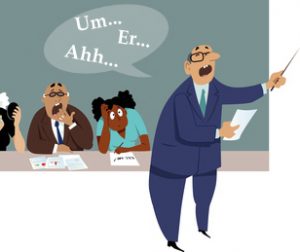One of the most annoying traits among some public speakers, be they professional or novice, is verbal disfluency. According to Wikipedia, verbal disfluencies are, “any of various breaks, irregularities, or utterances that are often not consistent with any specific grammatical construction and occur within the flow of otherwise fluent speech.” What is important to note is the fact that verbal tics interrupt smooth speech.
Including, ums, ahs, uhs, and the overused expressions, you know and like, verbal disfluencies are something you should concentrate on eliminating. They hinder the concentration of your audience who often stops listening to your words and instead starts counting your ahs.
One of the reasons we use um or ah is as a filler sound because we do not allow ourselves to pause by means of silence. The pause is very effective as long as it is not overused.
You can eliminate your verbal disfluencies by means of the following tips.
- Record yourself when you are practicing your speech or presentation. [More than likely, your ums and ahs will not happen in a prepared speech because you are reading from a script; however, it will be more apparent in a presentation in which you are speaking around notes or slides.]
- Study the recording and listen to yourself. Concentrate on when and how often you say these utterances. This is very important as you need to begin to recognize when it is happening.
- Record yourself again and concentrate on listening to yourself as you speak. Instead of saying the um or ah when you feel it trying to slip out of your mouth, pause, take a quick breath, and then continue speaking.
- In general, pay more attention to yourself when you are talking, be it in conversation or over the phone, noting if it is happening in more casual settings as well.
Your reason for public speaking is to impart a message. If that message is replete with um, ah, like, and you know, then your audience will concentrate less on your message and more on your interrupters. Projecting a confident image and sounding professional involves eliminating bad habits and establishing good ones.
You are judged not only by what you say but by how you say it; therefore, it is your responsibility to do the best job you can. And that is not possible if your delivery is marred by oft-repeated sounds or words, you know?
__________________
Want to work on your presentation skills and discover your ‘real’ speaking voice in the process? Join me in Mt Laurel, NJ, March 22 & 23, for my next 2-Day Voice & Presentation Skills Workshop.

